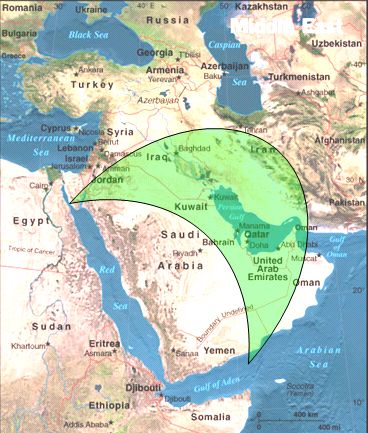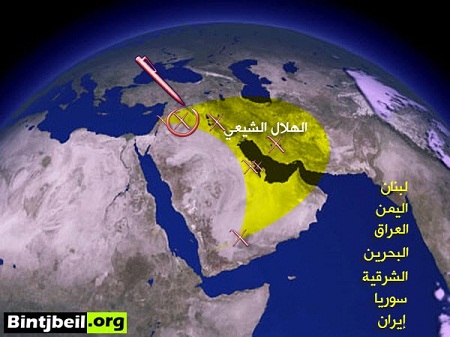Saudi Arabia’s former intelligence chief, Prince Muqrin, once told American diplomats the Middle East’s so-called Shiite Crescent where the Muslim sect holds sway was "becoming a full moon" as Iranian influence spread.
Saudi Arabia's former intelligence chief, Prince Muqrin, once told American diplomats the Middle East's so-called Shiite Crescent where the Muslim sect holds sway was "becoming a full moon" as Iranian influence spread.
 In an article by Angus McDowall, Reuters news agency echoed the concerns of Saudi princes, who fell into the trap of sectarianism conspired by the West, and who fear of Iranian influence.
In an article by Angus McDowall, Reuters news agency echoed the concerns of Saudi princes, who fell into the trap of sectarianism conspired by the West, and who fear of Iranian influence.
“That fear, revealed in a 2009 U.S. embassy cable released by WikiLeaks, now focuses on Syria. Iran-backed President Bashar al-Assad's forces are advancing with the aid of Lebanese Hezbollah Shiite fighters, while Riyadh supports the Sunni rebels fighting against him.”
According to Reuters, “it is a war increasingly seen in Riyadh as the fulcrum of a wider geopolitical struggle with Iran, a country it believes is radical, expansionist and militant, and a potential threat to Saudi Arabia itself.”
Abdulaziz al-Sager, head of the Gulf Research Centre in Jeddah, revealed other aspects of strategic concerns of Saudi Arabia in Syria:
"If the Syrian government wins, it will prove to other Arab countries that Iran is able to protect its allies in the region. This will undermine Western alliances and Western allies."
Since the victory of Syrian al-Qusayr city achieved by the Syrian Army this month, there has been growing unease in Riyadh: Western countries, above all the United States, have given mixed signals, calling for Assad's downfall but refusing so far to send arms or use force.
The U.S. President Barack Obama signaled that Washington would arm the rebels, but has not yet explained how or when that might begin, while the Saudis are still skeptical of Western support and expanded its own weapons supply to include anti-aircraft missiles.
However the Saudis no longer believe that the supply of weapons and the consultations of tactics are sufficient for the insurgents to end the Assad regime.
“The four men running Syria policy in the Saudi Arabia - King Abdullah and three of his nephews - Foreign Minister Prince Saud al-Faisal, intelligence chief Prince Bandar bin Sultan and National Security Council deputy chief Prince Salman bin Sultan - want more U.S. involvement in Syria,” Reuters said, adding that “the presence of Hezbollah became twice of the Iraqi brigade Abolfazl al-Abbas which the prince Turki dubs ‘the iron grip of Iran’.
Indeed, it is this presence that pushed the Arab leaders of Persian Gulf countries and their thugs to resort to religious speech, which is their great fear today.
But a Saudi analyst confirmed that “Riyadh rulers are well aware of the danger of such religious speech … although they believe openly sectarian rhetoric can backfire by helping mobilize Shiites in support of Assad as much as it fires up the rebellion.”
“Worse still, it alienates potential backers in the West and draws Sunni militants to the conflict that can later pose a threat to Riyadh,” the analyst added, voicing Saudi fears of Wahhabis.
In case of direct war against President Assad, Saudi Arabia - although a custodian Air Force performance - can only play a limited role, for the Saudi aviation showed its limitations in 1991 during the war against Saddam Hussein in Iraq.
"Russia remains committed. Iran remains committed. The Western allies are not committed to the degree and level you would like to see. That raises an important issue. In this way Assad can win," said Sager.
According to the report, Riyadh is aware of the dangers of U.S. interference in Syria, especially since the insurgents are far from being united. Riyadh has a dilemma to solve: how can the insurgents, energized by the extremist Wahhabi thought, be supporters of the so-called ‘Western democracy’, so Obama can support them?
It is in this context, almost catastrophic, the moderate Sheikh Hasan Rouhani came to power in Iran: the latest news, the Saudi Deputy Foreign Minister welcomed the call for calm he launched, calling for improvement in bilateral relations between the tow countries based on mutual respect.
Any exit?
